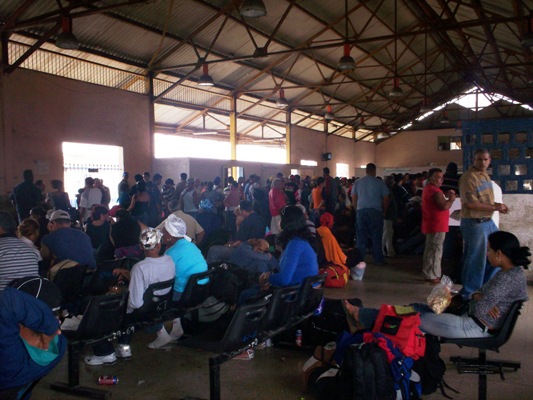 There is still a labyrinth of parliamentary procedures. But the U.S. Congress is considering authorizing the travel of its citizens to Cuba. The measure appears to have great potential for adoption.
There is still a labyrinth of parliamentary procedures. But the U.S. Congress is considering authorizing the travel of its citizens to Cuba. The measure appears to have great potential for adoption.
Already the Castro brothers are sharpening their teeth. If the gringo politicians say yes, cash registers will overflow with dollars. Let the ‘bucks’ (dollars) we are waiting for come, it could mean the government of the island!
And how needed they are. We know that the Cuban economy is not even treading water. For 17 years, since they legalized the possession of dollars in 1993, in large part, the emigrants, the despised ‘worms’, as Fidel Castro liked to say with some rage, are those who have kept the impoverished economy from sinking.
Yes. Its more than one billion greenbacks a year are the lifeline of a regime that has always been repulsed by the “American way of life.” The United States is public enemy number one for Fidel Castro. But there’s been a lot of water under the bridge since 1959.
And while you stir the guts of the old guerrilla commander, in this 2010, the land of Stars and Stripes is the leading seller of food to Cuba. Also their NGOs are the ones who provide the most help. And Cuban-Americans, are an important segment of the people who come to go sightseeing and spend hard currency.
The embargo is a fossil of the cold war. A joke. It only served as a pretext for Castro to maintain his authoritarian policies and to deny a handful of essential freedoms to his people.
It always had more holes than Swiss cheese. While Castro, the one with the beard, shouts himself hoarse in any public plaza, talking about what the country suffered because of the”blockade,” while hard currency shops and cafes sell Coca Cola and Dell computers.
For the rest, the world condemned the prohibitory and unilateral policy of Washington to Havana. It is healthy that the administration of Obama reconsiders. And demolishes all the scaffolding mounted on a stage that many years ago said goodbye.
Cuba is no longer a prodigal and conflicting son of the former USSR. Let it be known, Latin American and African guerrillas are not training in military camps on the island, to create pockets of civil war in other nations.
To not allow U.S. citizens to travel to the island was a major folly. It brazenly violated their rights. The champion of democracy and freedoms could not afford such nonsense.
Either way, Americans who wanted to, could come to Cuba through a third country. More than 50 thousand per year, according to reliable figures. Although they feared the Castros.
If the embargo ends and travel is allowed he will continue ruling with an iron fist all who oppose him, and then the eyes of the world will be on an anachronistic and undemocratic regime.
Already the local mandarins have tried out a few variations. If the Yankees take their foot off the accelerator, it could be that the Cuban government, kicking the ball back into Obama’s court, might make some mid-sized changes, maybe even some profound ones.
Those who govern our destinies do not believe in representative democracy. But will do what they have to do to stay in power.
No wonder that during the stay of the Spanish Foreign Minister Miguel Angel Moratinos, in the coming days, they will release 52 political prisoners from the Black Spring of 2003. As a reward for Spain’s Socialist Party, a faithful friend through thick and thin. And as Spain will be able to claim the laurels, it will not appear that such releases have been conditioned by the possible openings from Obama’s government.
With that, the Castros will kill two birds with one stone. They get the international pressure to ease up a bit, and incidentally, unlock the European Union’s common position. That fox Moratinos knows a thing or two. He already said there could soon be some surprises.
This summer brings a three-way political game. United States, Spain and the Cuban Catholic Church, which is chosen by the government to serve as mediator in the conflict with the Yankees and the release of political prisoners.
The brothers from Birán need peace and some leeway to implement a series of tough and unpopular ecnomic measures to get the country out of the hole created by bad management. If tomorrow the Yankees land in Havana, it won’t only benefit the managers of tourism. It will benefit the Castros, too.
And, of course, the Cubans who live on the informal economy. And there are many. Gringos putting dollars into the hands of private homes for rent and buying illegal tobacco boxes. Whores chasing after the blong guys, tall and unmarried from America, they might even propose marriage.
As I write this note the news still hadn’t run from mouth to mouth, but the neigbors I talk to receive it with great joy. Even the married and ex-military party militant. The happiest, the private taxi driver who brought me to a hotel and the waiter who served me coffee while I connected to the internet.
The two gave me an opinion that I happen to share: “If the Cuban government wants the Americans to come en masse, they’re going to have to eliminate that diabolical 20% tax on the dollar.”
Otherwise the Yankees are going to keep on visiting Punta Cana.
Iván García
Photo: Patricio Bridges, Flickr




 There is still a labyrinth of parliamentary procedures. But the U.S. Congress is considering authorizing the travel of its citizens to Cuba. The measure appears to have great potential for adoption.
There is still a labyrinth of parliamentary procedures. But the U.S. Congress is considering authorizing the travel of its citizens to Cuba. The measure appears to have great potential for adoption.
 Written by: Yadaimí Domínguez
Written by: Yadaimí Domínguez


 The article by Juan Varela Pérez, faulting the control and dedication in the sugar harvest, published in the daily Granma on May 5, 2010, is evidence that the critical condition of Cuban sugar production reflects the situation of agricultural production and the of the economy in general.
The article by Juan Varela Pérez, faulting the control and dedication in the sugar harvest, published in the daily Granma on May 5, 2010, is evidence that the critical condition of Cuban sugar production reflects the situation of agricultural production and the of the economy in general.